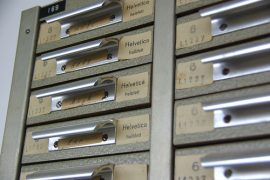Either A&E Television is super smart or I’m easily manipulated. On January 1, the cable channel ran a marathon of Hoarders, the documentary-style television program that shows extreme hoarders getting help to deal with their illness and their (often disgustingly) cluttered and dirty homes.
I watched several episodes.
Let’s get one thing straight: I am not a hoarder. But like most folks, I do have a clutter problem. Hoarders makes me feel better about my own issues, while learning a bit about how to let go of material things. And besides, professional organizing has always been a fascinating career. The process of helping someone get organized — their spaces, their collections, their time! — is akin to waving a magic wand.
Getting organized is one of the most common New Years resolutions, so I’ve invited professional organizer Janine Adams, who owns Peace of Mind Organizing in St. Louis, Missouri. Not surprisingly, she uses math in her work. Here’s how.
What do you do for a living?
I help people create order in their homes and their lives. I specialize in working with folks who are overwhelmed by clutter and for whom getting organized is a lifelong challenge. Though no two clients are alike, I typically help in the area of decluttering, then creating systems to help people function smoothly in their homes. My special skill is in gently guiding people who have a special relationship with their things so that they can let go of stuff and feel okay about it.
When do you use basic math in your job?
When someone has too much stuff to fit into their space, we sometimes have to figure out what percentage of their things they might need to part with in order to be able to store everything. So the client might agree that he or she needs to part with three of a particular type of item for every one kept, for example. When creating storage systems, I typically try to subdivide spaces using bins, so I use simple math to figure out how many bins will fit on a shelf, for example. When working with clients on creating habits and routines and time management, we break down the day into small increments and try to figure how long things will take and what can actually get done in a given amount of time.
Some organizers do a lot more space planning than I do (I’m spatially challenged, so I don’t do space planning). I imagine they use more complicated math!
On the financial side of my business, I use math all the time, calculating my fees (I typically charge by the hour) as well as in calculating what I owe my subcontractors. I pay sales tax on any items I buy wholesale, but sometimes I round up or down to a whole number when I’m charging the client. Then, for bookkeeping purposes, I have to calculate the base price and the sales tax on it so that they equal the whole number.
Do you use any technology to help with this math?
I use the calculator on my iPod to check my math when I’m calculating what I’m owed (or owe subcontractors). I want to make sure I get it right. I also use a calculator when I’m figuring out sales tax. I use Quickbooks to help me with my bookkeeping and appreciate its math functionality.
How do you think math helps you do your job better?
If I didn’t know how to do basic math, I wouldn’t be able to run a business. I think it’s that simple. I feel like I’m constantly calculating fees, expenses, time available. Math is essential!
How comfortable with math do you feel?
This is very basic math. I’m comfortable with it!
What kind of math did you take in high school?
I was in an accelerated math program, but stopped at second year algebra, in 10th grade, because I didn’t enjoy it very much, to be honest. But I felt pretty good at it. I also took accounting classes, which have helped me in my two businesses (writing and organizing) and with home finances. What’s interesting to me is that I’m much better at basic math (the kind I use in every day life) than my husband is and he majored in applied mathematics in college.
Do you have questions for Janine? Ask them in the comments section. And be sure to come back on Wednesday and Friday. I’ll show you exactly how you can use math to help yourself get organized.

